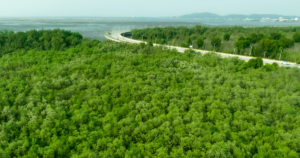This article was first published on InvestorIntel, when InvestorIntel’s CEO Tracy Weslosky, asked whether I could write a piece, or “my take” on Indaba. I returned from Cape Town’s Mining Indaba over a week ago and I managed to put off this piece hoping she would forget about it. However, Tracy, for those who have had the pleasure to work with her, does not forget anything when it comes to publishing. So here I am, making due on my commitment to produce a piece on the “Mining Indaba according to Lara” and in some small way offering our readership a more personal window into my otherwise public persona as a “mining analyst.”
On the surface, at least compared to last year, the Mining Indaba showed signs of exuberance. The weather played ball, the setting in Cape Town was idyllic, companies were out in full force, attendance was up 40% on last year, you could not get a dinner seat at the V&A Waterfront for love or money, the exhibit hall was completely full, companies were still cutting costs on peripherals such as corporate gifts and licking their wounds from the last few years, but they were there.
I was also present at the second day of the 121 Meeting, a conference, which for the past three years has overlapped with Indaba, and is focused on bringing investors and companies together. This was extremely well attended and indeed has grown substantially since its inception. Many junior hopefuls had the budget to attend and the investors were interested and seemingly had the pockets to commit to projects. I attended a few investor meetings with one of our investor clients, looking specifically for a junior copper/cobalt play and I could see the level of competition to invest in these juniors was far more intense than in the previous few years.
Attending the Indaba presentations in the main hall, companies reiterated a few times, and indeed I tweeted about this, that “Chinese money is looking for a home” and “even though resources have been downtrodden, investment is coming up as investors scramble for a bargain.”
These sentiments were echoed at the various parties that I attended and side-line conversations. Kobus van der Wath, CEO of the Beijing Axis, at their annual Indaba Cocktail Party, allayed fears of a China slowdown, stating that while we will not see the kind of exponential growth we saw over the last twenty years, China still has appetite for global commodity investments and there is plenty of Asian money looking to get a return and that resources were a natural choice.
As a commodity analyst, whose fortunes correlate perfectly with commodity markets, I should be elated and partying like its 2002 again (and make no mistake, I am). Yet, as a South African, my mood is more introspective.
Born in the early 80’s-I’m too young have experience the full extent of Apartheid, but at the same time too old to have been a “born free.” I was not completely sheltered as those born in post 1994 after the establishment of the New South Africa. I remember small incidences of Apartheid and cultural norms. For instance, it is a cultural norm in South Africa to this day for a child to address an adult as Mam, Sir, Mr, Mrs or for more intimate acquaintances you may use Uncle or Aunt. To many of my friend’s children I am “Aunty Lara,” but as much as we were brought up to respect our elders, we addressed black citizens by their first names. I understand now, as an adult, looking back, that this is Apartheid.
Apartheid served to break down South Africa’s culture, which ironically is a culture of respect for elders and people, and this value is applicable across the colour bar. Apartheid ensured that each racial group learns, in their own way, to afford respect only to those within the same racial group. Note that I was not brought up a racist, my parents were anti the regime and promoted equality and respect, yet at the same time, Apartheid was a system that permeated even the most tolerant of households.
As a child, I knew black people were all poor and many times, destitute, but at the same time the converse was not necessarily true, namely that all white people were rich. White people were not rich, and I for one, came from a humble upbringing and we went through over a decade where we were poor, as South Africa’s economy fluctuated wildly and it was easy to be caught on the wrong side. Access to education is what really divided Black and White in my mind, rather than rich or poor. With education, you had a chance. Without it, you were doomed to join the ranks of the multitude of unskilled (largely black) labourers. And whilst my parents fought the Apartheid system in their own small way in order to ensure a fairer society for my sister and I, it was confusing as there was this fearful undercurrent that once the Apartheid system fell, we should be ready to immigrate as there would not be a place for us whites in South Africa. Yet I remember well as an eleven year old, my fear in case Apartheid did not end as there would surely be a civil war and what chance would us “whites” have? So as a child I feared the continuation of the Apartheid regime and simultaneously, I feared the discontinuation of the Apartheid regime.
Suffice to say, time took away the mystery of the unknown. Apartheid ended in 1994, the transition was peaceful and us whites were not driven out, cast out, flushed etc and I was able to grow up and establish myself firmly as a successful, self-made, internationally-known, South African woman in the Mining Industry no less. My accomplishment is the embodiment of the hope all South Africans have for this country, namely to see all its citizens able to contribute positively and for South Africa to take its place as a key contributor to global industry.
In the twenty years prior to the GFC-a post Apartheid era, the global economy experienced unprecedented demand for commodities. South Africa benefitted, but not nearly to the level that it should. We had a platform and a New Country, we were a miracle country with resources to offer commodity-hungry nations. Yet, during this time, South Africa saw 6,000 mines close and nearly 5,000 workers laid off due to poor foreign direct investment (FDI) policies.
Yes, the writing is on the wall. I have said it many forums, including on radio, industry presentations and in various interviews that unless South Africa reviews its FDI policies, we will not be able to participate fully in any commodity growth cycle. I have all but been dismissed as a white bourgeois in an interview on a “black” radio station for not being an advocate of redistribution. Understand this, I am an economist, and I am a South African and I have witnessed first-hand suffering in this country that I proudly call home. I am absolutely an advocate of redistribution, but as an economist, I must absolutely object to redistribution without growth. And as we have seen we cannot have growth without investment and we cannot have investment if we insist on enacting policies that do not support investment.
So, for me, the opening few presentations at Indaba, was the culmination of twenty years plus of poor investment policies. In particular, Mark Cutifini’s (CEO of Anglo American) speech said it all.
South Africa’s President Jacob Zuma remarked in a December address that he would not “bow to “white monopoly capital” amid claims that he took advice from outside business interests on certain cabinet appointments. Mark Cutifini, CEO of Anglo American used the Indaba platform to state that sentiments of “white monopoly capital” is “both false and misleading.”
Cutifini continued by stating that the industry has transformed immensely in that Black South Africans now own approximately 45% of South Africa’s mining assets.
South Africa’s Minister of Mines, Mosebenzi Zwane, spoke about the overhaul of the Mining Charter, which is now waiting for a High Court Judge to decide whether it should be declared invalid.
The Charter calls for the establishment of a Mining Transformation and Development Agency (MTDA) which will collect 40% of the ZAR5bn the mining sector annually contributes towards human resources development. In addition, there will be a 1% tax levy on the revenue of foreign suppliers, which will also end up in the MTDA account.
Cutifini, alluded to the Mining Charter woes where he rightly indicated that South Africa, should be careful about ending up in court to solve disputes between government and industry. In many ways, he is correct as we cannot, as a country, promote ease of doing business to foreign investors and simultaneously continue to end up embroiled in legal battles with the very foreign investors we are trying to attract!
And there it is. Indaba for me is a forum which shines a spotlight on South Africa for 6,000 visitors, mostly foreign, to see. To play host to such a forum, means we cannot hide from the realities that spoil our country. So, amidst all the exuberance and the excitement of the possibility of a new “Spring” in the resources industry, unless something shifts drastically in the South African political system and this polarisation, or rift, if you will, between Government and Industry ends, and the two get on the same team, South Africa will never be a meaningful contributor to global industry and the hopes my parents and many others, had for a fairer society for their children, will not be realised.






